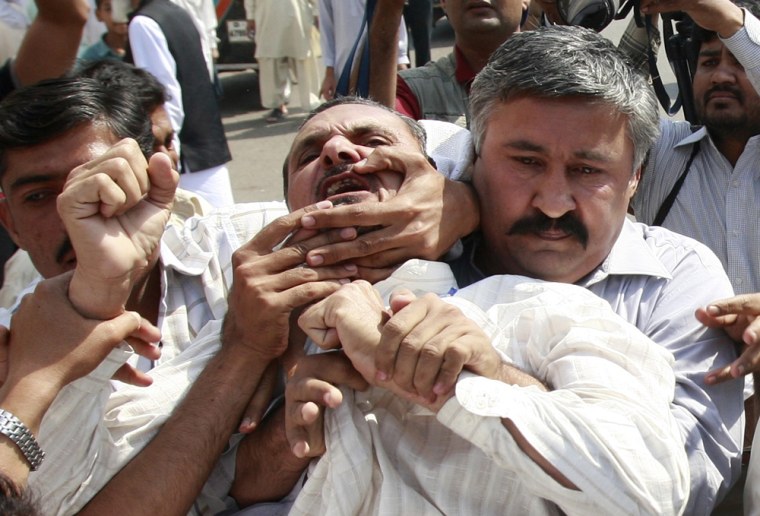Club-swinging police blocked the way out of Pakistan's biggest city Thursday, scattering hundreds of demonstrators as the government sought to contain a protest movement that is emerging as a major challenge to its shaky one-year rule.
With anti-government activists vowing to press ahead, the U.S. stepped up efforts to mediate a solution to the crisis, which threatens to undermine its goal of getting nuclear-armed Pakistan to do more in fighting al-Qaida and Taliban militants along the border with Afghanistan.
Richard Holbrooke, the Obama administration's envoy to Pakistan and Afghanistan, called Prime Minister Yousuf Raza Gilani, government officials said. The U.S. ambassador met with opposition leader Nawaz Sharif in a bid "to get things resolved," Sharif spokesman Sadiqul Farooq said.
Officials on both sides declined to give any details of the discussions, and there were no signs of any breakthrough to calm political squabbling that is looking a lot like the unrest that preceded the removal of former military ruler Pervez Musharraf last year.
Activist lawyers are demanding President Asif Ali Zardari fulfill a pledge to reinstate judges fired by Musharraf, a general who ousted Sharif as prime minister in a 1999 coup. But the protest movement heated up last month when the Supreme Court banned Sharif and his brother from elected office.
After the ruling, the federal government dismissed the Punjab provincial administration led by Sharif's brother, stoking anger in Pakistan's most populous region and putting the pair and their supporters on a collision course with Zardari.
'Long march' planned
The lawyers' movement, Sharif's party and other small political groupings called a "long march" to begin Thursday across the country, with groups of protesters planning to converge on the parliament building in Islamabad on Monday and begin a sit-in.
Government officials said they would allow protesters only to gather in a park close to the capital, vowing to keep them from massing outside parliament or in other downtown areas. Officials banned protests in much of the country Wednesday and detained more than 360 activists.
On Thursday, several hundred protesters in Karachi, the country's largest city, set off for Islamabad in a convoy or cars, buses and motorbikes. They were stopped by police trucks blocking the highway out of the city, and officers with clubs moved in to arrest the leaders, engaging in brief scuffles.
While some protesters sped back into Karachi, several people sat on the road chanting "Zardari is a traitor! Zardari is a dog!" before being arrested. After clearing the highway, police dragged several protesters from a nearby restaurant and a mosque.
"Why is a democratic government crushing a peaceful protest?" asked Naeem Qureshi, secretary-general of Karachi Bar Association. "There is no difference between it and a martial law regime."
That's a theme increasingly heard from more Pakistanis, who are comparing Zardari to Musharraf.
"The only difference is that Musharraf was a military dictator while Zardari is a civilian dictator," said lawyer Rana Asad, who was detained for 30 days during Musharraf's 2007 crackdown on critics and is planning to join the current protests.
Another group of several hundred demonstrators departed the southwestern city of Quetta, and had not been stopped by nightfall. Protests are expected to gather strength as people in Punjab attempt to set off for the capital over the weekend.
Adding to tensions in a country with a history of political assassinations, Sharif's spokesman claimed the opposition leader had received "reports" that the government was plotting to kill him. The charge was denied by an aide to Zardari as "political gimmickry and no more."
There were signs the crisis was causing cracks in the ruling party, which rose to power on a wave of sympathy votes following the assassination of Zardari's wife, former Prime Minister Benazir Bhutto, by suspected Islamic militants before the 2008 elections.
"This is the time that someone should come ahead and urge President Zardari to take the right path. Otherwise it will be very damaging for the party," said Safdar Abbasi, a senator who is a senior member of the party. "Peaceful marches should not been crushed."
In recent days, leaders of other political parties have shuffled between Sharif, Zardari and Gilani, seeking a solution to the crisis, but there has been little evidence one is forthcoming.
Most of the judges fired by Musharraf have been restored to their posts, but the government has ignored a few, including a former Supreme Court chief justice. Zardari is believed to fear that those judges could move to limit his power or reopen corruption cases against him.
The lawyers say their demand for the restoration of all judges is nonnegotiable. But some analysts say Zardari could defuse the crisis in the short term at least by restoring the opposition-led government in Punjab.
The meeting between U.S. Ambassador Anne Patterson and Sharif took place at Sharif's mansion, Farooq, the Sharif spokesman, said.
"It is not only the American ambassador; other friendly countries are in contact," he said.
The U.S. Embassy said it does not comment on the ambassador's meetings, but foreign help in resolving political disputes in Pakistan has been common in the past.
New suspected U.S. strike
Also Thursday, a suspected U.S. missile strike killed seven people in northwestern Pakistan, killing seven unidentified people, a government official and a witness said.
A senior Kurram official said the house targeted was believed to be frequented by Islamist militants. He spoke on condition of anonymity because he was not authorized to release the information.
Villager Ismail Khan said spy planes were seen hovering over the area shortly before the attack, adding that local militants had retrieved seven bodies from the destroyed house.
The United States has launched more than 30 missile strikes on al-Qaida and Taliban targets since last year, killing many militants but also civilians — threatening to further inflame anti-U.S. sentiment in a key ally in fighting Islamist terrorist groups.
More on Pakistan
